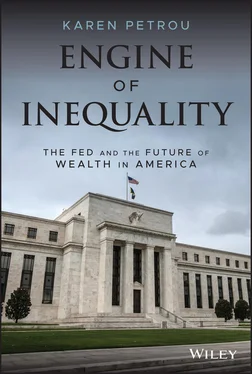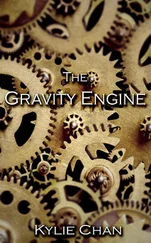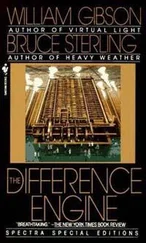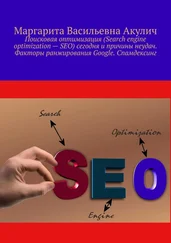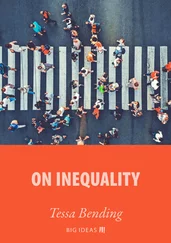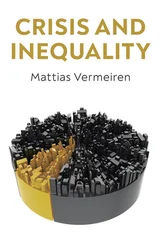44 43. Jeanna Smialek, “Powell Says Federal Reserve Crossed Red Lines to Help Economy,” New York Times, May 29, 2020, available at https://www.nytimes.com/2020/05/29/business/economy/powell-federal-reserve-economy-coronavirus.html.
45 44. BIS, “Annual Economic Report 2019,” 56 (June 20, 2019), available at https://www.bis.org/publ/arpdf/ar2019e.pdf.
46 45. Libra, “Introducing Libra: A simple global currency and financial infrastructure that can empower billions of people,” Libra.org, June 23, 2019, available at https://libra.org/en-US/wp-content/uploads/sites/23/2019/06/IntroducingLibra_en_US.pdf.
47 46. Tom Wheeler, “Who makes the rules in the new Gilded Age? Lessons from the industrial age inform the information age,” Brookings Institution Center for Technology Innovation, December 12, 2018, available at https://www.brookings.edu/research/who-makes-the-rules-in-the-new-gilded-age/.
48 47. Jonathan Fisher, David Johnson, Timothy Smeeding, and Jeffery Thompson, “Estimating the Marginal Propensity to Consume Using the Distributions of Income, Consumption, and Wealth,” FRB-Boston Working Papers No. 19-4 (February 2019), available at https://www.bostonfed.org/publications/research-department-working-paper/2019/estimating-the-marginal-propensity-to-consume-using-the-distributions-income-consumption-wealth.aspx.
49 48. Cynthia L. Doniger, “Do Greasy Wheels Curb Inequality?” FRB FEDS 2019-021 (March 12, 2019), available at https://www.federalreserve.gov/econres/feds/files/2019021pap.pdf.
50 49. Council of Inspectors General on Financial Oversight, U.S. Department of Treasury, Annual Report of the Council of Inspectors General on Financial Oversight 43 (July 2012), available at https://www.treasury.gov/about/organizational-structure/ig/Documents/CIGFO%20Document/508_CIGFO%20Annual%20Report.pdf.
51 50. John Kenneth Galbraith, “A Journey Through Economic Time,” Interview by Brian Lamb, Booknotes C-SPAN, November 13, 1994, available at https://www.c-span.org/video/?60409-1/a-journey-economic-time.
Chapter 2 How Unequal Are We?
For the first time in decades, we are no longer simply concentrating wealth in the hands of a few. We're concentrating and creating the most inclusive economy ever to exist. We are lifting up Americans of every race, color, religion, and creed.
– President Donald J. Trump*
If President Trump is right, then the rest of this book is a waste of time. Why bother to show that post-crisis financial policy has made Americans even more unequal or devise ways to fix it for equality's sake if we aren't unequal?
The answer lies in the data deluge that is to come in this chapter. Normally, loads of numbers are many numbers too many. However, when a president and many of his advisers and supporters insist that America is equal and then some, it is vital to demonstrate that America has been increasingly unequal since 1980, that it was at levels of income and wealth inequality not seen since World War II before COVID hit, that many other nations are more equal than the US, that African Americans were even more unequal in 2019 than before the civil rights era, and that all of these underlying trends skyrocketed to unprecedented inequality when post-crisis financial policy changed the distribution of wealth in the US starting in 2010. It will take some time to count COVID's long-term impact on American economic inequality, but the ravages it wrought on household wages and employment show irrefutably that the pandemic made inequality worse along with pretty much everything else it touched. Reforming financial policy is thus a still more urgent equality priority.
Economic Inequality Fundamentals
Throughout this book, I refer to “economic inequality” even though much popular discussion focuses on “income inequality.” The reason to focus more broadly on economic inequality is that there are at least two key components that determine the have-a-lots, have some, and have-nots in the US and across the globe.
First indeed comes income. This is what you and others in your household earn from the fruits of your labor (i.e., from your job), the benefits you get from the government minus the taxes you pay, and what you earn from your savings accounts and investments (including pension income and capital gains). Although different ways to count “income” in the Tax Code have different statistical effects, income is often and I think rightly measured after taxes to capture the equality impact of changing taxation policy.
Most income measures also and again rightly capture “transfer payments” – welfare, tax credits for purposes such as child care or education, public pensions such as Social Security, and other government income. Income equality is also affected – a lot – by capital income – that is, how much we earn on investments such as stocks, bonds, and savings accounts and whether we realize a profit when we sell our home or any of our investments. Very few measures of income equality look also at how far our income goes to maintaining a comfortable life – what we used to call being middle class. However, in this book, I'll look not only at what you earn, but also at what you have left over to spend on day-to-day essentials without going still more deeply into debt.
In short, income is what you earn and wealth is what you keep. Wealth is usually measured as net worth – i.e., the value of owned assets minus any debt needed to accumulate them. This is the right way to assess equality since debt burdens not only chew up income to make us poorer, but also expose us to the acute risk of personal bankruptcy or home foreclosure. Because the value of the assets wealthy households own – stocks and bonds – soared since 2010, and these households have little to no debt, they have done very, very well. 1 Wealthy households that depend on financial assets are also more resilient households than lower-income ones for whom the main source of wealth is a home. It's of course far easier to sell a few stocks or bonds to tide one over a hard patch or even a crisis such as COVID than to sell one's abode. 2
Worse, the real inflation-adjusted value of the most important asset for many Americans – our homes – stayed flat after 2010 even as markets soared. 3 Putting many of us farther away from any hope of wealth accumulation, homeownership was increasingly out of reach because of the debt burdens that rose sharply after 2010. This is now record-breaking, 4 due in part to the huge cost younger Americans bear to fund their educations. Before COVID created its own economic catastrophe, student debt exceeded 100 percent of income for US millennials with student debt and is an astounding 372 percent of income for the least well-off.
Failing to combine both income and wealth into considerations of economic inequality quickly leads one astray. Working these income and wealth drivers into specific cases, one can see that thrifty retirees with large real-estate holdings able to leave a large inheritance look relatively poor based on “income” but quickly show up among America's most prosperous once wealth is considered. Conversely, two young people beginning their working careers might look similar in terms of income, but the one given a large house down payment by his or her parents is a good deal wealthier and has far better long-term equality prospects than the other, who not only lacks parental support, but may well also pay large student-loan bills that cut deeply into consumption capacity and long-term wealth accumulation. Affluent parents are a great comfort to their relatively wealthy millennial offspring, with 63 percent of them saying that their own retirement security depends on inheritance from parents, grandparents, and even friends.
Looking only at income also masks the inability of low- and moderate-income (LMI) households to amass the wealth needed to move into the middle class through capital-income-generating savings accounts or growing home equity. Having a small or even no cushion against the unexpected means that households can quickly lose what little they have after something as minor as a blown tire, let alone an event as eviscerating as the economic shutdown due to the novel coronavirus. Data from the Federal Reserve show just how close many of us with relatively robust incomes were to the edge even if our income pushed us into the nominal middle class – 37 percent of American adults (almost 100 million) feared that they could not handle an unexpected bill of only $400 no matter the seeming prosperity of late 2019. 5 Even a small rainy-day fund is essential for household resilience, but as COVID hit in April 2020, almost one-third of Americans lacked a rainy-day fund of more than three months. 6
Читать дальше
